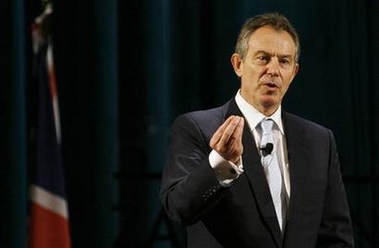Blair to urge Mideast states to rein in Iran
(Reuters)Updated: 2006-12-20 09:47
DUBAI - British Prime Minister Tony Blair will call on Wednesday for Middle East states to rein in what he calls the threat from Iran and to help advance peacemaking between Israelis and Palestinians.
|
|
"We must recognise the strategic threat the government of Iran poses, not its people, not possibly all of its ruling elements, but those presently in charge of its policy," he will say, according to extracts of his speech released by his office.
Iran seeks "to pin us back in Lebanon, in Iraq and in Palestine", he will tell business leaders in Dubai.
"Our response should be to expose what they are doing, build the alliances to prevent it and pin them back across the whole of the region."
He says to do this "we need the open and clear backing of the countries in this region that know better than me what is happening and why".
Blair's spokesman dismissed suggestions his comments on Iran were designed to pit the region's Sunni Muslims against Shi'ite Iran, saying the prime minister worked with all faiths.
The prime minister -- making a push for peace in the Middle East before he leaves office next year -- will say the struggle between "moderates and extremists" will impact the security of the wider world.
"It is not too late but it is urgent," he will say.
Blair visited Turkey, Egypt, Iraq, Israel and the Palestinian territories before arriving in the United Arab Emirates.
Aides say Blair made progress on the trip in exploring ways to end a deadlock between Palestinians and Israelis.
IRAN, SYRIA
He will pursue talks with world leaders in early 2007, particularly on a package of aid for Palestinian President Mahmoud Abbas.
Abbas has called for elections after failing to form a unity administration with the Hamas-led government, which is being boycotted by the West.
He will list three priorities: to give Abbas's office the capacity to improve Palestinians' lives; to engineer an early meeting between Abbas and Israeli Prime Minister Ehud Olmert and to relaunch the political process for a two-state solution.
"We must support and empower moderate and modernising governments and people everywhere in this region," Blair will say.
"We must mobilise our alliance of moderation in this region and outside it and defeat the extremists" whose ideas are based on a "warped" interpretation of Islam, he will add.
Late on Tuesday, Blair told the Dubai-based Al Arabiya television that Syria should help to restore stability in Lebanon, Iraq and Palestinian Territories, but did not rule out peace in the region without its support.
"I agree that peace would be easier in the Middle East with Syria, but we cannot allow Syria to decide for the region," he said. "We will engage with Syria only if they agree on conditions for this partnership," he added but did not elaborate. His remarks were aired with Arabic translation.
|
||
|
||
|
|

